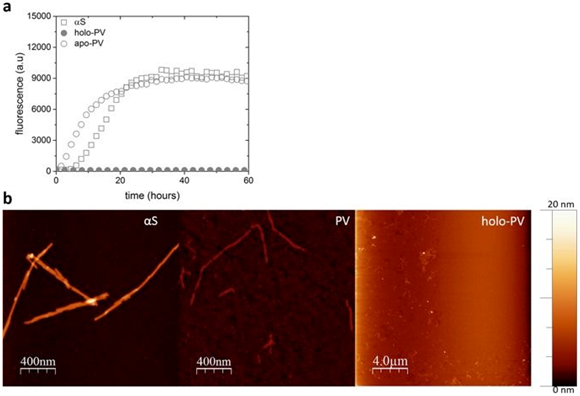论文标题:Abundant fish protein inhibits α-synuclein amyloid formation
期刊:Scientific Reports
作者:Tony Werner, Ranjeet Kumar, Istvan Horvath, Nathalie Scheers, Pernilla Wittung-Stafshede
发表时间:2018/04/03
数字识别码: 10.1038/s41598-018-23850-0
原文链接:http://t.cn/ELRNZJD
鱼类体内最常见的过敏原是β-小清蛋白,这种蛋白质在鱼体内含量丰富,能够形成淀粉样结构以避免胃肠道降解并进入血液。在人类中,相同的淀粉样蛋白结构主要与神经退行性疾病如阿尔茨海默症、帕金森症有关。近日Scientific Reports发表的研究Abundant fish protein inhibits α-synuclein amyloid formation对这些淀粉样蛋白之间的可能联系进行了探究。
来自瑞典查尔姆斯理工大学的Pernilla Wittung-Stafshede及其团队使用的是重组大西洋鳕鱼β-小清蛋白和帕金森病中的主要淀粉样蛋白——α-突触核蛋白。通过一系列体外生物物理方法,研究人员发现β-小清蛋白能抑制α-突触核蛋白形成淀粉样蛋白。实现这种抑制的背后机制是α-突触核蛋白会与β-小清蛋白淀粉样蛋白纤维表面相结合。
除了这种全新的淀粉样蛋白抑制机制外,研究数据还表明,β-小清蛋白与人体淀粉样蛋白的交叉反应也可部分解释食用鱼肉带来的健康益处。

图1:不同的蛋白分别形成淀粉样蛋白结构的ThT荧光图(a)和AFM图(b)。
摘要:The most common allergen in fish, the highly-abundant protein β-parvalbumin, forms amyloid structures as a way to avoid gastrointestinal degradation and transit to the blood. In humans, the same amyloid structures are mostly associated with neurodegenerative disorders such as Alzheimer’s and Parkinson’s. We here assessed a putative connection between these amyloids using recombinant Atlantic cod β-parvalbumin and the key amyloidogenic protein in Parkinson’s disease, α-synuclein. Using a set of in vitro biophysical methods, we discovered that β-parvalbumin readily inhibits amyloid formation of α-synuclein. The underlying mechanism was found to involve α-synuclein binding to the surface of β-parvalbumin amyloid fibers. In addition to being a new amyloid inhibition mechanism, the data suggest that health benefits of fish may be explained in part by cross-reaction of β-parvalbumin with human amyloidogenic proteins.
阅读论文全文请访问:http://t.cn/ELRNZJD
期刊介绍:Scientific Reports (https://www.nature.com/srep/) is an online, open access journal from the publishers of Nature. We publish scientifically valid primary research from all areas of the natural and clinical sciences.
The 2017 journal metrics for Scientific Reports are as follows:
•2-year impact factor: 4.122
•5-year impact factor: 4.609
•Immediacy index: 0.576
•Eigenfactor® score: 0.71896
•Article Influence Score: 1.356
•2-year Median: 2
(来源:科学网)
特别声明:本文转载仅仅是出于传播信息的需要,并不意味着代表本网站观点或证实其内容的真实性;如其他媒体、网站或个人从本网站转载使用,须保留本网站注明的“来源”,并自负版权等法律责任;作者如果不希望被转载或者联系转载稿费等事宜,请与我们接洽。